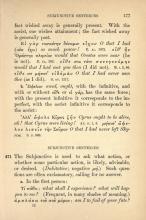471. The Subjunctive is used to ask what action, or whether some particular action, is likely, advisable, or desired. (Dubitative; negative μή.) Such questions are often exclamatory, calling for no answer.
a. In the first person.
Τί πάθω;
What shall I experience? What will happen to me?
(Frequent, in many shades of meaning.)
ἀμπλάκω τοῦ σοῦ μόρου;
Am I to fail of your fate?
Soph. Antigone 554
τί φῶμεν πρὸς ταῦτα; ἄλλο τι ἢ ὁμολογῶμεν;
What shall we say to this? Anything else than to agree? (Shall we not agree?)
Plato Crito 52d
τί δρᾱ́σω; δεύτερον ληφθῶ κακός;
What shall I do? Shall I be caught in wrong again?
Soph. Philoctetes 908
πῶς λιπόναυς γένωμαι;
How can I desert the fleet?
Aesch. Agamemnon 212
μὴ ἀποκρῑ́νωμαι, ἀλλʼ ἕτερον εἴπω;
Shall I make no reply, but say something else?
Plato Republic 337b
ἀλλὰ δὴ φυγῆς τῑμήσωμαι;
Shall I then propose the penalty of exile?
(Cp. τίνος ἀντιτῑμήσομαι; Apology 36b, the future indicative in the same sense.)
Plato Apology 37c
b. In the third person.
Ποῖ τις οὖν φύγῃ; ποῖ μολὼν μενῶ;
Whither shall one flee? Where shall I go and abide?
Soph. Ajax 403–404
εἶτα ταῦτʼ οὗτοι πεισθῶσιν ὑπὲρ αὑτῶν σε ποιεῖν;
This, then, are these people to believe you are doing for them?
Demosthenes 22.64
472. The Subjunctive may present the action as proposed, desired, or urged. (Hortative, in the first person; negative μή.)
Ὦ παῖδες, ἱστώμεσθα.
My children, let us rise.
Soph. Oedipus the King 147
δεῦρο ἐξαναστῶμεν εἰς τὴν αὐλὴν καὶ περιιόντες αὐτοῦ διατρῑ́ψωμεν, εἶτα ἴωμεν.
Let us rise, go out here into the court, and pass the time walking about there (until daylight); then let us go.
Plato Protagoras 311a
φέρʼ ἐπʼ αὐτὴν ἴω.
Let me go to her! (I want to go to her!)
Aristoph. Frogs 291
φέρε δὴ καὶ τᾱ̀ς μαρτυρίᾱς ἀναγνῶ.
Come, now, let me also read the testimony (I will now read).
Demosthenes 18.267
Once in the second person, Soph. Philoctetes 300.
The first person singular is often introduced by φέρε.
473. The Subjunctive with μή presents the action as not desired, as unadvisable, or as forbidden. (Prohibitive)
a. In the first person (not to be separated from the hortative subjunctive, § 472, above).
Μή ἀναμένωμεν ἄλλους.
Let us not wait for οthers.
Xen. Anabasis 3.1.24
μὴ δῆτʼ ἀδικηθῶ.
Let me not be wronged. (in entreaty; cp. b.)
Soph. Oedipus at Colonus 174
b. In the second person (aorist only).
Μή λίπῃς μʼ οὕτως μόνον.
Leave me not thus alone.
Soph. Philoctetes 470
c. In the third person (aorist only).
Μηδεὶς εἴπῃ.
Let no one say.
Demosthenes 9.16
μηδενὶ τοῦτο παραστῇ.
Let this occur to no one.
Lysias 12.62
474. The Subjunctive with μή sometimes expresses what one fears and desires to avert; with μὴ οὐ, what one fears will not be. This is a variety of the preceding (§ 473, above), the starting-point of more common uses (see §§ 609, 610).
Μὴ σοὺς διαφθείρῃ γάμους.
May she not spoil thy marrriage.
(i.e., I fear she will)
Eur. Alcestis 315
μὴ οὐ πείσῃs σοφούς.
You will not convince the wise, I fear.
Eur. The Trojan Women. 982
a.This is also softened to a cautious assertion, or made a question.
Μὴ ἀγροικότερον ᾖ τὸ ἀληθὲς εἰπεῖν.
I fear it's rather rude to speak the truth.
Plato Gorgias 462e
ἀλλὰ μὴ οὐ τοῦτʼ ᾖ χαλεπόν.
But I suspect that is not difficult.
Plato Apology 39a
475.The tenses of the subjunctive do not refer to differences of time. The present denotes continuance or repetition; the aorist, simple occurrence or attainment; the perfect (infrequent), denotes a completed act or a continued state. The distinction often disappears in translating, but is not to be overlooked.
a. The time of independent subjunctives is regularly future; see examples in §§ 471 – 474 (above). In Homer the subjunctive is often very like the future indicative in meaning, often also the same in form.




